– contributed by Lizette Royer Barton. For a screen reader compatible pdf of this post and documents contained within, click here.
I asked my colleagues who their favorite women were in our collections. Here are a few of the responses.
Processing Archivist Emily Gainer replied with Erika Fromm. Emily processed the Fromm papers a few years ago and you can review the finding aid for the 115-box collection here: Erika Fromm finding aid. Emily told me, “At one point, she [Erika Fromm] had a student harassing/stalking her. Campus admin told her if he called, not to answer. She said she would answer, because that’s what she does – help people.”
Erika Fromm (1909-2003) earned her PhD in experimental psychology in 1933 from the University of Frankfurt while studying with Max Wertheimer (Emily processed those papers too); worked as a research associate in clinical psychology in the Department of Psychiatry, Wilhelmina Gasthuis (University Clinics), Amsterdam; established the first psychology laboratory in a Dutch state hospital; fled the damn Nazi’s; and eventually emigrated to Chicago, IL where she established a private psychotherapy practice and became a professor in the Department of Psychology at the University of Chicago.
Being a foremost expert on hypnosis and hypnoanalysis, Erika Fromm was approached by psychologists in Germany requesting permission to translate some of her work to German. The Erika Fromm papers contain several folders of correspondence with the journal editors and correspondence she received from readers (both positive and negative) regarding her decision not to allow the translation. Instead, she wrote a paper titled, Personal Feelings of a Nazi Refugee: Why I do not Want to be Honored by Germans, which was published in the German journal Hypnose Und Kognition instead of her translated work on hypnoanalysis. Fromm considered the translation of her work an honor, but was deeply conflicted about receiving such an honor from a German journal. Her paper is hard to read and harder still to fathom what she survived. And while we all hold our own feelings about forgiveness, perhaps sometimes, we have to simply respect when a person just can’t do it.
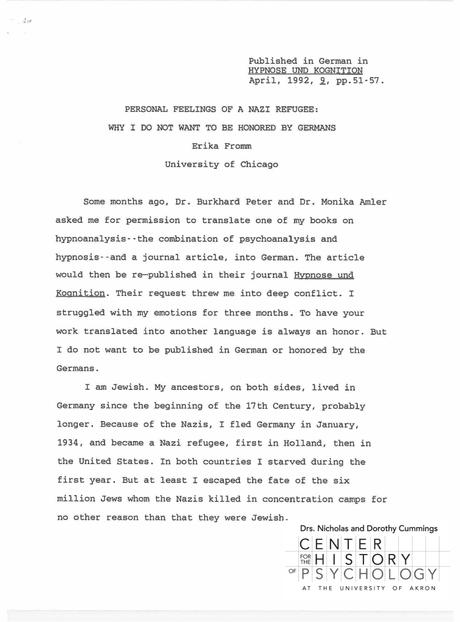
Dr. Cathy Faye, Director of the CCHP, couldn’t give me just one name.
“I’ve always liked Ruth Cruikshank Bussey. Mostly because I liked the photos of her in the collection. I think there were a couple good ones of her from her time in the WAVES and personal journals and scrapbooks. I just remember browsing those and liking her a lot. I’d love to know more about Jewish psychologist Sylvia Scribner….early on, she was quite a union activist, I think. Not sure if the collection reflects any of that.”
Ruth Cruikshank Bussey (1911-2007) earned her BA at Elmira College and went on to earn her MA and PhD from Brown University. During the Second World War she served in the Air Service Command (ASC) and later enlisted with the Women Accepted for Volunteer Emergency Service (WAVES), a division of the Navy. She continued her work in psychological testing at the Psychological Corporation. And Cathy was right, the scrapbooks and journals in this collection are incredible. Bussey has letters, report cards, clippings, announcements, and more glued and taped to the pages alongside her handwritten words in scrapbooks and journals from her time in high school well into old age. There are hundreds of treasures but this assignment from her Elmira College course, “Life Work Choice” is among my favorites. The assignment was for students to list their first three choices for work to which Ruth Cruikshank answered, “My work must be with science…I know of its hardships for I have a family none too eager to see me as a woman doctor, stepping in a career belonging only to men.”
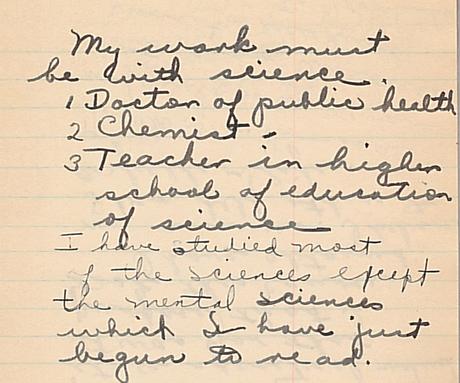
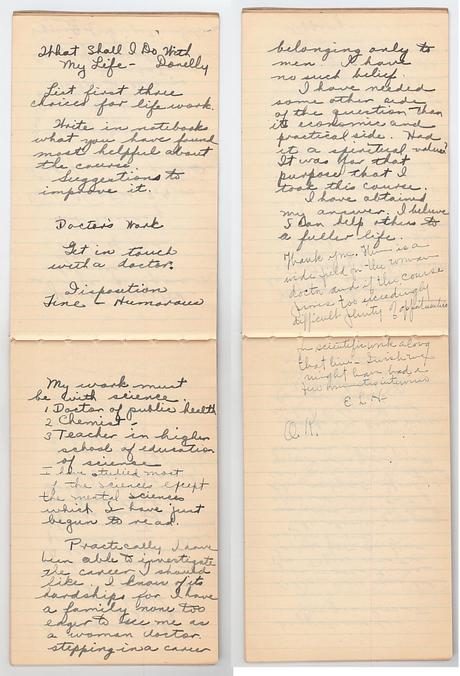
Sylvia Scribner (1923-1991) was the valedictorian of her class at Smith College in 1943 and went to work as the research director for United Electrical, Radio and Machine Workers of America. She later returned to school, earning her MA from the City University of New York (CUNY) and a PhD from the New School of Social Research in 1970. She was on the faculty at CUNY, worked as a senior research associate at Rockefeller University, the associate director of the National Institute of Education, and as a senior scientist at the Center for Applied Linguistics. She focused on cultural literacy and learning, worker’s rights, women’s issues in society and the workplace, minority concerns, and labor practices and the more I learned about her, the cooler she became.
Scribner took up a research project at a dairy processing plant to study learning and knowledge through recall between different groups at the dairy – customers, office workers, warehouse workers, and delivery drivers. The collection has detailed interview notes and materials from the study. In her published work from the study, Scribner writes that the observations at the dairy were useful in that they, “…stimulate new ways of thinking about knowledge and practice that avoid the old entrenched dualisms” and “social knowledge is differentiated from, but not opposed to, individual knowledge.” Scribner conducted similar recall research studies in Liberia and concluded, “…recall output tends to reflect the organizational structure subjects impose on material” and regardless of culture, age, or geography these processes seemed to be universal.
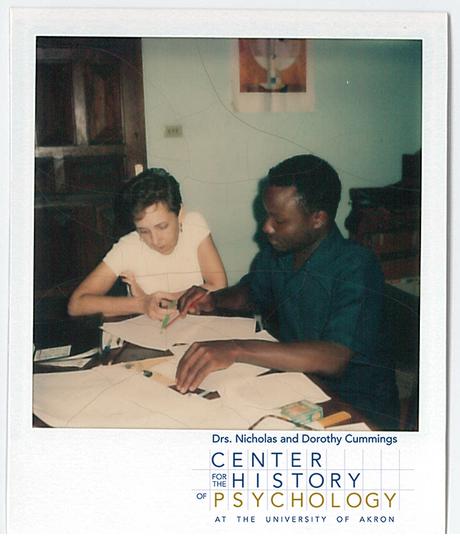
Sylvia Scribner papers, box V81, folder 8
In describing Scribner’s research to Dr. Faye she said to me, “It’s the human and social element. Each place has its own society and its own forms of social knowledge that work for that place and those people.”
Dr. Jodi Kearns, Director of the Institute for Human Science & Culture told me Molly Harrower was her favorite because, “she seems badass.” Also, when asked by T. Kraweic in his oral history series about her philosophy of life, Dr. Kearns told me that Harrower gives the “Best. Answer. Ever.”
Molly Harrower (1906-1999) took some psychology classes while at Beford College, University of London with Beatrice Edgell but never earned a psychology degree. She worked with Charles K. Ogden and with a helpful letter from him, Harrower arrived at Smith College on a fellowship to work with Kurt Koffka. She earned her PhD in 1934 and went on to work with Wilder Penfield at the Montreal Neurological Institute, established a private practice and did work in psycodiagnostics and psychotherapy, consulted in the military, served as Research Director of the Children’s Court of Manhattan, wrote poetry, and eventually joined the faculty at the University of Florida, teaching clinical psychology until her retirement.
The Molly Harrower papers include numerous still images and I asked Dr. Kearns to pick a couple of her favorites.
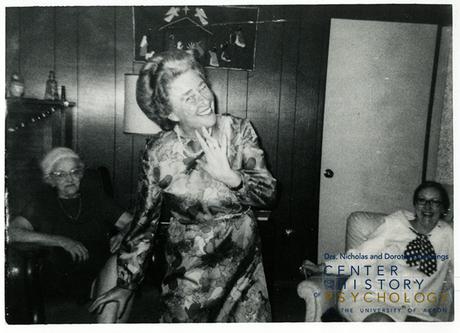
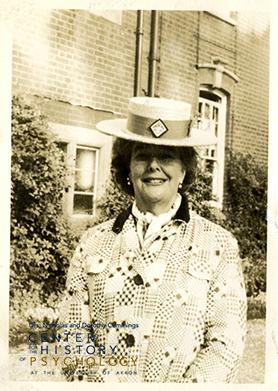
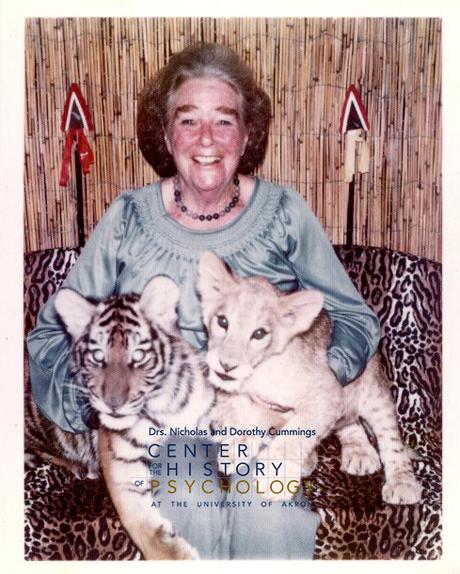
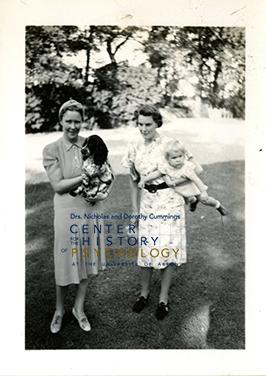
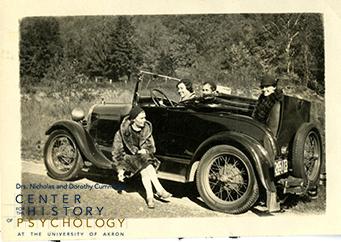
Molly Harrower papers, box V53
And Dr. Kearns was right. When T. Kraweic asked at the end of an hour long oral history interview her philosophy of life, she laughed and gave the best answer ever. “I practically have no prohibitions….If it isn’t fun, what is it? There are millions of things you can do and doing one you don’t like doesn’t help anybody….If you can harness all your energy and all your enjoyment and all your creativity into some form of action that’s what you should take. And that’s what I try to do.”
Hearing Molly say these words is mostly certainly better than reading them.
So listen here:
Theophile S. Krawiec collection, box A13, tape 40
There are numerous inspiring and important women in the collections here at the Cummings Center. Women who changed the course of the history of the field. But when it comes down to brass tacks, “numerous” isn’t actually very accurate. Of the 466 processed manuscript collections we house, just 81 of them are the personal papers of women. So, who is my favorite woman in the collection? I’m not sure and maybe her papers aren’t here yet.
To twist Molly’s words a bit, “If history isn’t inclusive, what is it?”
Happy Women’s History Month.
